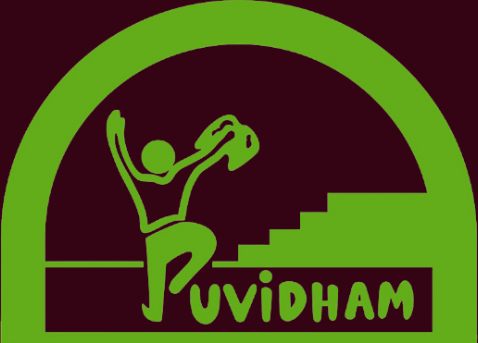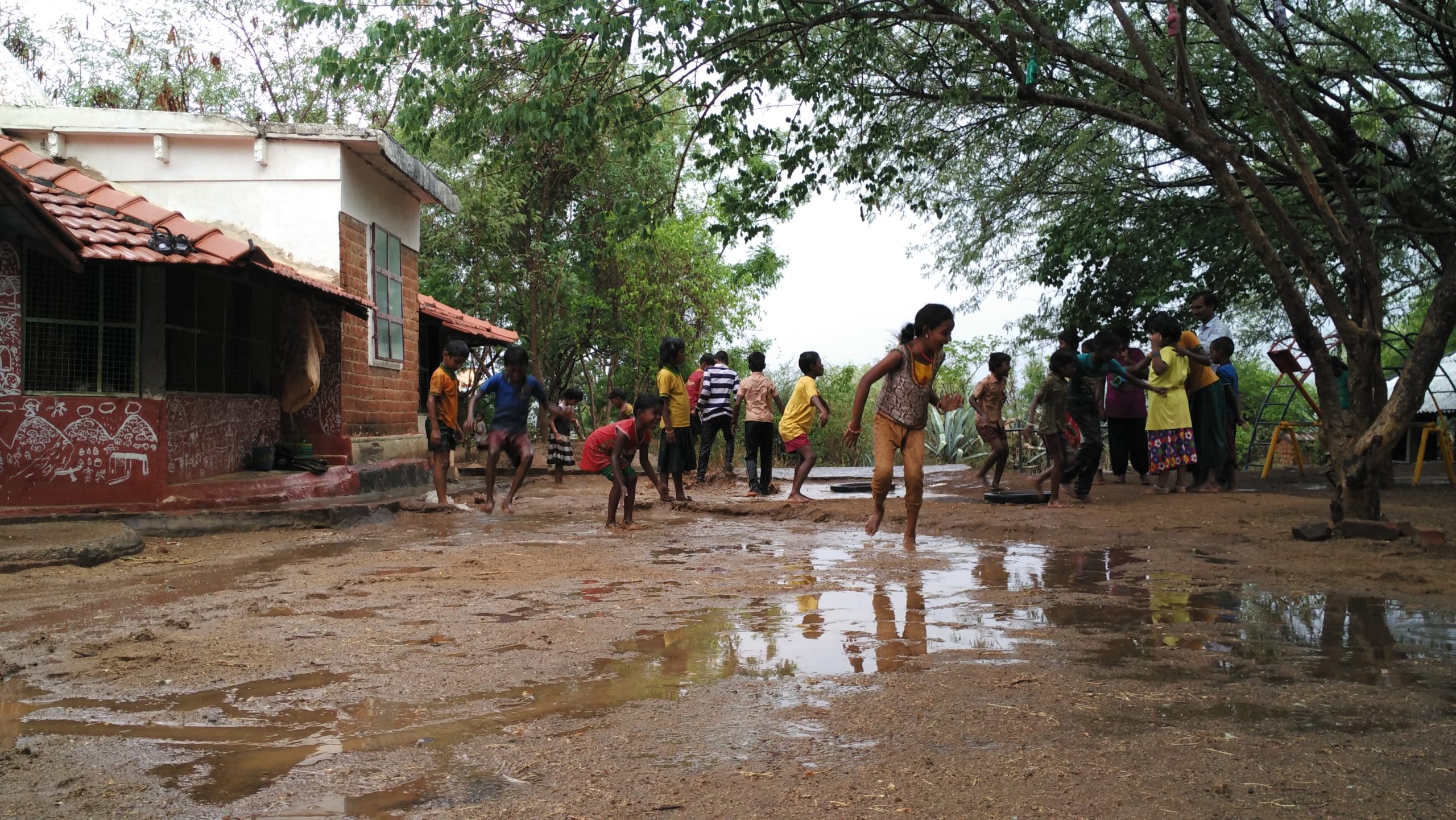Return to the Soil : A 2 day workshop. Click here for Registration. Contact: Kaya at +91 8098770203/9342977823
Payment for the workshop can be done to following UPI ID eazypay.2000040292@icici
Puvidham Learning Centre is a space for children where they can be children. The camp for two days is being conducted for people who are curious to know what children do and how they learn is such a space.
Essentially there is minimum teaching at Puvidham. We have a lot of time for observation of nature and discussion about what the children feel and think about what they see. The children are engaged through stories and songs written by the team to inform children about the concerns of the adults at Puvidham. These concerns are
• The increase in mindless consumerism
• The distance from nature
• The destruction of nature
• The depletion and pollution of resources like water
• The toxic food and air for our children
• The unhappiness of the child
• The stress related learning difficulties increasing in children
• The lack of living skills and basic values in the present generation
• The inaction of the present generation to make a difference in their own lives
• The lack of understanding and tolerance
• The increased violence in society
If you are concerned about such things you can attend the camp to seek solutions in changing the way of life you lead.
During the camp, the participants will get to do everything that the children here do. There will also be time for discussion with the founder Mrs Meenakshi.
All your questions about education of the children in this age and time shall be answered to the best of our ability. We shall also share our philosophy and learning material .
Children learn better when they can make things and do things.
When children experience there is no need to memorize – why?
When children work they use both their hands. This helps in improving the wiring of the nervous system. This further helps in their ability to use their hands with precision and in coordination with the other faculties.
Both their right and left brains develop properly and they blossom to the maximum.
Their confidence improves and they feel worthwhile and competent.
Their learning is through their body and senses and they do not forget what they learn.
They are happy and free to move around and exercise their will.
They are cared for and care for others in return.
They listen to others because others listen to them.
They become responsible citizens and take up chores even at home.
They know that they are trusted and they live up to the trust.
They love themselves for their capabilities and creativity and hence they love the others around them.
They are empathetic and cooperative.
They grow up to be adults who have had a complete childhood and so they are very resilient.
All kids live in the present moment and have the capability to forget and forgive. They are little Buddha’s. They live in the present moment, they are happy most of the time and they flow with the moment.
When they have a good childhood, they can understand the purpose of their life and live a meaningful life.
They realize their dreams and lead a good life, without seeking gurus for self-realization.
They become leaders and thinkers who act with conviction!
Questionaire for Parents
There is a need to focus on what we teach and why. The society is designed in schools. We can be consumers, producers, exploiters, creators or cheaters depending on how we went through our schooling. This is a questionnaire for the parents of THE WORLD to dream the kind of society they would like for their children and have a say in the design of the education system that will create this society.
When did the child begin to make eye contact with the parents? How did you teach the child that you were the parents? How much time did it take to teach this?
When did the child begin to make its needs clear? How did you teach your child to make its needs clear by action? How much time did it take to teach this?
When did the child begin to say words? How did you teach your child to say mama, appa? How much time did it take to teach this?
When did the child begin to walk? How did you teach your child to walk? How much time did it take to teach this?
How many children do you have? Did they all take the same time to learn these things? Did you teach them all with equal interest?
Could you have taught differently to improve the learning? Could you have done it earlier and thereby given the child a head start?
Would it have made a difference to the child if you had used better methods to teach the child to walk, talk and write earlier?
When did you decide to send the child to school? Ans: 2years 3 y 4y /Which school did you chose? Nearest to the house, govt school / private school, faraway school, specify Why did you prefer it over the other schools? Distance, child’s happiness, fame of the school.
Is your child happy going to school every day? How do you know?
Do you love your child? Do you trust your child? Do you want your child to be happy?
Is your child unique? Do you compare your child with the other children?
Do you accept your child as a gift of nature especially for you? Yes/ no ans only
Do you wish your child was more intelligent? Do you wish your child was smarter?
Do you wish that your child should respect all others? Do you wish that others respect and admire your child?
Which qualities in a child are admirable? Which qualities are unwanted? What do you think is the priority for learning among the following : ( number according to priority) how to fool others, how to help others, how to show others what the child thinks, how to respect others, how to humiliate others, how to understand others, how to earn money, how to protect nature, how to be a responsible citizen, how to initiate action, how to complain about others, how to be calm and patient, how to reason and think, how to take blame for one’s faults, how to help others accept their faults without hurting them, how to change others, how to change themselves, how to bring people together to do positive action, how to create something, how to lead a simple sustainable life, how to evaluate and understand oneself, how to judge others, how to humiliate others, how to be sarcastic, how to imitate, how to relate to others from diverse backgrounds.
What do you think is a good life? -A simple life with minimum comforts, least damage to the environment and most happiness. A lot of comforts and commodities even though we know making of each item destroys some more of the earth’s resource. Comfort in comparison with and equal to others in the neighbourhood.
Do you want your child to lead a life as good as the one you had? Would you like him/ her to have an old badly maintained house or a good strong one? (the earth is the house)
Would you want your child to have an A.C or fresh clean air with plenty of oxygen from trees and herbs?
Would you want your child to be able to make wise decisions based on his/her understanding and experience or to follow the crowd?
Is working in the house and garden a shameful thing for you? Do you think working with your hands to grow vegetables is a lowly activity?
How would you like it one of your guests made a mess in the toilet each time he/she used it? Would you be angry or understanding? Would you teach the guest how to clean it?
Would it matter to you if your doorstep was littered after you had cleaned it?
Does it matter to you that your street is littered? Would you like it if it was clean or dirtier still?
What connection do you think education has with dealing with the instances mentioned above?
How would you like it if you had control over the water you drink and could get it from a well near your house? (Very much, no real difference, it’s not possible to have control.)
How would you help someone who was working in your area to make this possible? Support with money, support with physical help, not support. Would you consider him/her foolish or brave?
What would you tell your child about that person? Crazy guy/girl, be like that and take care of your environment coz no one will do it for you, this is the job of the govt.
Are you aware of the damage we have done to the earth’s soils, water, air and ecosystems?
What do you think will help your child more – learning how to protect and respect the living and non-living resources of the earth or latest science and technological innovations.
What do you think gives more happiness to the child – playing with some toys or working to create something with his/her effort. On what experience are you basing this observation?
How do you think language is learnt? By listening and talking, by copying and writing.
What makes you most happy about your child- she/he helps you with your chores and you get to spend time with her/him or she/he plays games very well, or she/he goes climbing trees and enjoys treks and wildlife.
What would make you proud about your child- a good academic report, a good character report, an active participation in social or environmental cause report.
What would be your reaction to learning that your child is having learning difficulties? Anger, sympathy, empathy, guilt, self-pity, understanding, supporting, challenging, fear.
What would you say to your child if he/she brings home a friend who is academically challenged and is helping him/her with their work? (Don’t waste your time / that is so nice of you.)
When your child seems unhappy in school what would be your words to encourage her/him? (It’s okay, I know you don’t like it but there is nothing we can do about it, what are the reasons that you are uncomfortable there, would you like to learn at home.)
When someone says that your child is very mean and fights with everyone what will you do? (Go and talk to the child and ask him/her if anything had happened that the child wanted to share with you / tell the child that so and so was telling thus and why can’t he/she behave and stop being the cause of trouble / Tell the other person to mind his/her own business.)
How do you evaluate the progress of your child? by the reports given by the school, by sharing time with the child and seeing the level of interest and participation in all activities, by what other people observe about your child ..
Do you like being evaluated on the basis of your academic knowledge alone? Do you feel that is a way to decide on the usefulness and ingenuity of a person?

